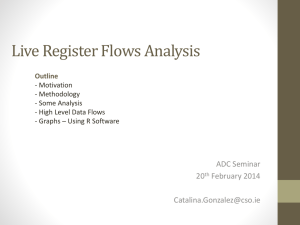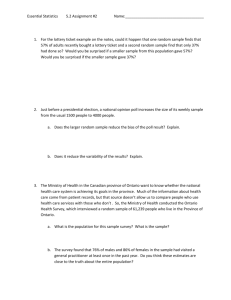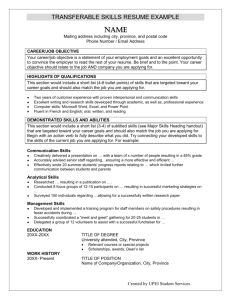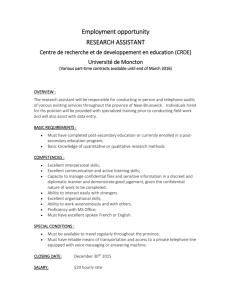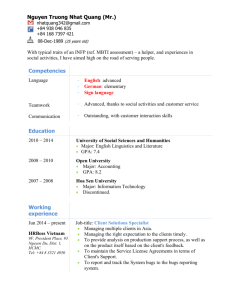Slide 1 - Institute for Social Research
advertisement
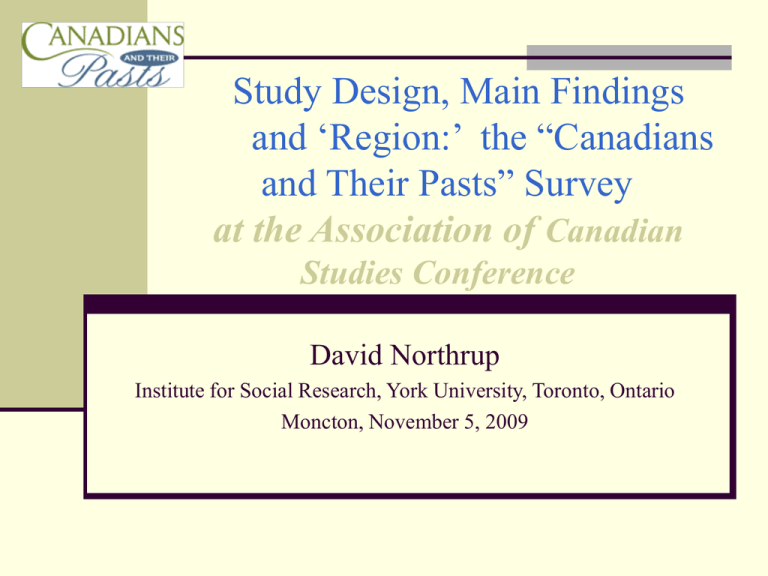
Study Design, Main Findings and ‘Region:’ the “Canadians and Their Pasts” Survey at the Association of Canadian Studies Conference David Northrup Institute for Social Research, York University, Toronto, Ontario Moncton, November 5, 2009 Outline of Talk how we did the survey three of our main findings set the stage for the rest of the session review the results of questions we had in the survey about region compare and contrast respondents who reside in their province of birth versus those who live in a different province how these respondents vary in how they answer the region questions 2 Study Design National Telephone Survey (3,419) RDD sample & next birthday selection Sample Components national sample: 5 regions of 400 interviews (2,000) major urban area sample, 1,000 interviews (Montreal, Toronto, Calgary, Edmonton and Vancouver) Supplemental Samples (100 each): Aboriginals (Saskatoon and area), Acadians (Dieppe, Petit-Rocher, and Caraquet), recent immigrants (Peel) Data Collection over 19 months at ISR and Jolicoeur 55% response rate 3 Questionnaire 75-80 questions, depending on answers to previous questions took, on average, 23 minutes to complete National 22, Aboriginal 28, Peel 26, Acadians 23 mostly closed-ended (forced choice) questions 11 open-ended questions more qualitative, more respondent-centred, no a priori list of answers taped and transcribed 91% of all respondents gave permission to tape their answers to the open-ended questions 4 Questionnaire Sections 1 2 3 4 5 6 7 8 general interest in the past activities related to the past (engagement) understanding the past (connectedness) trustworthiness of sources on the past importance of various pasts sense of the past biographical data questions unique to supplemental samples 5 New Brunswick and Quebec Samples National Sample Quebec Provincial Sample, n = 643 New Brunswick Provincial Sample, n = 104 RDD samples & next birthday selection sample distributed across the province in the same way as the population considerable confidence can generalize to the population Acadian Survey 100 people Dieppe, Petit-Rocher, and Caraquet targeted sample of three communities, random selection of respondent in household a snapshot of part of a larger community 6 Acadian Survey Same as national survey with 3 additional questions: 1) In the last five years did you participate in any activities that celebrated or commemorated Acadian heritage and history? 2) Which activities involving Acadian heritage or history did you participate in? 3) Could you please tell us what you might have learned about your Acadian background through these activities? 7 Engagement: 1 Family History % yes* Public History % yes photographs 83 movies 78 heirlooms 74 books 53 places (family past) 57 historic sites 49 scrapbook, cookbook, diary, other family history 56 museums 43 family tree 20 Internet 40 computer history games 8 archives 15 other activities 25 * % figures, this and remaining slides, national sample (3,119 observations), weighted data 8 Engagement: 2 almost all Canadians engage in activities where they encounter the past 99% engage in at least one activity 56% engage in more than five activities average number of activities = 6 (out of 13) 44% engage in the three most common family-related activities (photos and heirloom and scrapbook, cookbook, diary, other family history) 25% have read a book about the past and visited a museum and visited a historic site very high participation rates for family activities lower participation rates for public history activities 9 Engagement & Education: 1 80% 60% 40% 20% 0% museums* hist sites* internet* less than hs high school * significant in regression model books* movies* post high school archives* university 10 Engagement & Education: 2 80% 60% 40% 20% 0% photos heirlooms* less than hs fam places high school * significant in regression model scrapbooks, etc.* fam tree* post high school games university 11 Interest in Various Pasts/Histories Type of past/History in general family Canada very somewhat interested interested 33 52 32 52 39 54 not interested* Total % 15 9 14 100 100 100 * The ‘not interested’ percent includes ‘not very interested,’ ‘not at all interested’ and those who did not answer the question 12 Importance of Various Pasts Past very somewhat * not Total important important important percent family 66 33 1 100 religion or spiritual tradition ethno/cultural group 32 33 35 100 39 42 19 100 province 35 50 15 100 region** 21 19 60 100 Canada 42 48 10 100 * The ‘not important’ percent includes ‘not very important,’ ‘not at all important’ and those who did not answer the question ** very important % only for those who identified a region = 47% 13 Most Important Past 60% 40% 20% 0% none birth country region ethno cultural religion family Canada province 14 Family Might have been Part of a Larger History . . . mostly because the family have been in Canada for so many generations and I think it's important that we . . . that those of us that are alive today, are able to understand where we came from and what part we might have played in history - whether it was the fur trade or the Red River settlement and rebellions, and stuff like that. male, senior, BA, living in the Gulf Islands of BC (id 1407922) 15 Family Caught up in a Larger History That was 50 years ago, we came as refugees to Canada from Hungary where we escaped from the Revolution . . . 200,000 Hungarians escaped at that time and I had a five and a seven year old child . . . it was a very, very dramatic escape . . . We just celebrated the 50th anniversary . . . of the uprising of the revolution . . . A book [was] published and our family story is . . . in that book. This is most important event in my life . . . and it changed the whole future of the family . . . I mean, we never would come to Canada or leave the country if there was no revolution, the Russian repression. So I saw dramatic change in our lives . . . this is the most important . . . [it] changed my whole life. woman, senior, MA, professor of music living in Hamilton (id 1403392) 16 Family and Feeling Connected to the Past My mother-in-law died, we were looking through photographs to gather up some pictures to have at the wake… my uncle did a family tree, and he wrote stories of the community and . . . stories about family members who moved away . . . We have an old heritage house . . . that I've inherited . . It is full of lots of antiques and . . . old family things . . . it's a sense of history that you're passing on to your family and . . . I think it's important to know . . . where you came from, . . . the house is 160 years old and . . . it was built by my ancestors and of course, many, many generations have lived in that house, and [it] makes you feel, you know, connected, going through all the . . . old pictures and all the old clippings and old scrapbooks and things that were there. woman, mid-fifties, BA, retail manager, small town in PEI (id 1400457) 17 Three Findings most Canadians engage the past in many different ways family history predominates making, preserving, interpreting and consuming family history more participation in passive rather than active activities education is a powerful predictor of engagement to a lesser extent, so is gender the past of most interest, the past of most importance, and those activities related to the past that Canadians are most likely to be engaged in, are activities related to the past of the individual and their family 18 Regions Identified by Respondents: 1 Is there a particular region of Canada you identify with or feel a part of? Yes = 78% limited provincial variation but higher in PQ (87%) and lower in Ontario (70%) What is that region? province of residence = 44% (of those who identified with a region, or 34% all respondents) province, other than province of residence = 6% city of residence = 4% city, other than city of residence = 7% these 4 ‘regions’ total 61% of the responses 19 Regions Identified by Respondents: 2 region % region % southern Ontario 4.7 La Mauricie .6 the prairies 4.5 Eastern Townships .6 the west 3.7 the Rockies .5 northern Ontario 2.6 Okanagan .5 Maritimes 2.1 Charlevoix .4 Atlantic Canada 1.4 Pacific Coast .3 east/down east/east coast 1.4 Peace River .3 Saguenay/Lac-St-Jean 1.3 the North .3 south west Ontario .8 lower mainland (BC) .3 Le Bas-Saint-Laurent .8 Acadia .2 20 Current Province of Residence Same as Province of Birth (stayers) Province/Region % stayers % movers Atlantic Canada 82 18 Quebec 99 1 Ontario 88 12 Manitoba & Saskatchewan 81 19 Alberta 55 45 British Columbia 55 45 Canada 83 17 % figures, national sample, excludes not born in Canada, 2,538 observations, weighted data 21 Stayers and Leavers and Demographics leavers have higher levels of education most of the difference is accounted for by more university degree holders in the leavers group leavers have higher incomes more leavers in the $120,000 or more group no difference between movers and stayers with respect to gender, having children or coming from a rural or urban area limited difference with respect to age over representation of movers in the 51 to 64 age range 22 Stayers and Leavers and Atlantic Canada Regions in Atlantic Canada 80% said they identified with or felt part of a region, in the rest of the country the comparable figure is 78% 49% of Atlantic Canadian leavers said they identified with either Atlantic Canada, the Maritimes or Down East 32% of Atlantic Canadian stayers said they identified with these regions 25% of Atlantic Canadian leavers identified with their province 50% of Atlantic Canadian stayers identified with their province 23 Past of Province & Canada Rated ‘Very Important’ for Stayers 80% 60% 40% 20% 0% Nfld PEI Province NS NB Canada PQ Ont Man Sask Alb BC 24 Past of Province & Canada Rated ‘Very Important’ for Leavers 80% 60% 40% 20% 0% Nfld PEI Province NS NB Canada PQ Ont Man Sask Alb BC 25 ‘Very Interested’ in Three Pasts by Stayers and Leavers 60% 40% 20% 0% past (in general)* Stayers Leavers family* Canada* * difference is statistically significant (regression) 26 Pasts rated ‘Very Important’ by Stayers and Movers 60% Stayers Leavers 40% 20% 0% family region religion * difference is statistically significant (regression) ethno culutral province* Canada* 27 Tentative Findings: Region 1 few Canadians (in percentage terms) identify with a traditional Canadian region the exception (as Létourneau will argue) is Quebec those who identify regions, identify many most regions are geographically small typically most regions are not political or administrative units regions are ‘real’ but they are also ‘imagined,’ regions of the mind, regions where place and community overlap people who move within the country do have higher education and incomes than stayers, but are no more likely to come from rural areas, to have kids or to vary (much) by age 28 Tentative Findings: Region 2 even after ‘controlling for’ education and income, leavers are more likely to say: they are interested in the past of Canada, that the past of Canada is very important to them leavers are less likely to say the past of the province of birth was important to them Atlantic Canadians who leave their province of birth are more likely to identify with ‘the east’ as a region than those who continue to reside in their province of birth when it comes to interest in and importance of the past, identity for those who leave is not the same as for those who 29 stay Acknowledgements From the Pasts Team Margaret Conrad Jocelyn Létourneau From ISR John Pollard Mirka Ondrack Hugh McCague 30
